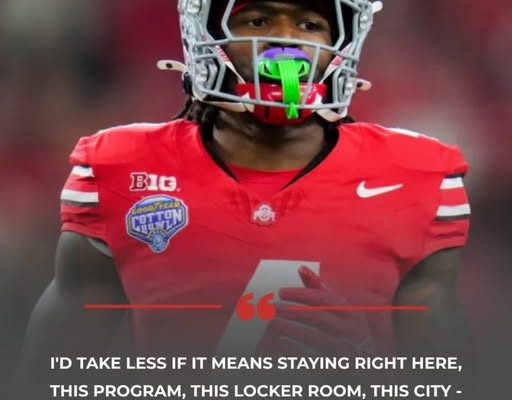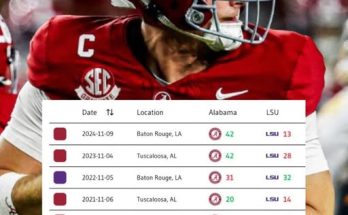In an era where the lines between college football and professional sports have blurred beyond recognition, Jeremiah Smith has delivered a message that feels both timeless and revolutionary. The Ohio State wide receiver, one of the most electrifying young talents in the nation, stunned Buckeye Nation this week with an emotional and deeply personal admission. Speaking candidly about the pressures of the modern NIL (Name, Image, and Likeness) landscape, Smith revealed that he deliberately turned down larger financial offers to remain at Ohio State — a decision rooted not in money, but in loyalty, love, and a sense of belonging.
“I’d rather stay home than chase the money,” Smith said, his voice steady but weighted with emotion. “I came here for a reason. This place means something to me — the people, the fans, my teammates, the coaches. You can’t put a price on that.”
Those words hit differently in today’s college football world. As NIL collectives grow stronger and schools across the country vie to lure top-tier talent with seven-figure deals, Smith’s statement felt like a rallying cry for something bigger than business — a reminder that, for some players, passion still trumps profit.
Jeremiah Smith’s story is already becoming legend in Columbus. A Florida native and five-star recruit, Smith arrived at Ohio State with sky-high expectations, hailed as one of the most polished wide receiver prospects in recent memory. With his combination of size, speed, and football IQ, comparisons to Buckeye greats like Marvin Harrison Jr. and Garrett Wilson came early and often. But what has separated Smith from the rest isn’t just his athletic ability — it’s his maturity, his values, and the perspective he carries in a sport increasingly defined by financial opportunity.
Behind the scenes, multiple programs reportedly made aggressive NIL pitches to Smith, offering deals that dwarfed what he could earn in Columbus. For many players, that kind of money would have been hard to ignore — and few would’ve blamed him for chasing it. But Smith’s heart was set on something else entirely.
“People don’t understand — it’s not just about football here,” Smith explained. “It’s about family. Coach Hartline believed in me before anyone else did. Coach Day gave me a chance to play for something special. When I walk into that stadium and see those fans, it’s home. That means more to me than any paycheck.”
For Ohio State fans, his words struck an emotional chord. In a sport where players often transfer at the first sign of a better deal or more exposure, Smith’s decision felt like an act of defiance against a shifting culture. He wasn’t just reaffirming his commitment to the Buckeyes — he was reaffirming the values that built the program in the first place: loyalty, integrity, and pride in the scarlet and gray.
The reaction in Columbus was immediate. Social media exploded with messages of support, gratitude, and admiration. Buckeye Nation rallied around their young star, calling him “the heart of the team,” “a true Buckeye,” and “the kind of leader this generation needs.” Former players, alumni, and fans echoed the sentiment that Smith’s words were a breath of fresh air in a landscape dominated by headlines about transfers and NIL drama.
But what makes Jeremiah Smith’s stance so powerful is not just what he said — it’s what it represents. College football is in the midst of a transformation. The introduction of NIL rights has given players long-overdue opportunities to profit from their own names and likenesses, but it’s also created an arms race among schools and collectives. Top recruits now navigate offers not just based on coaching or culture, but on the size of their potential contracts. Loyalty has become rare. Tradition has taken a backseat to transaction.
And yet, here’s Jeremiah Smith, standing firm in the belief that some things are still sacred. His decision to stay at Ohio State despite bigger offers elsewhere is more than just a personal choice — it’s a statement of identity. It’s a declaration that the soul of college football isn’t lost, even in the face of rapid commercialization.
“I’m not against NIL,” Smith clarified in his interview. “I think players should absolutely be able to take care of their families and benefit from their hard work. But for me, I just didn’t want to make a decision based on money. I wanted to make a decision based on love, purpose, and what feels right in my heart.”
Those words reveal a depth far beyond his years. At just nineteen, Smith is articulating a truth that many veterans of the game struggle to understand — that fulfillment in football, as in life, comes not from chasing the biggest paycheck, but from chasing meaning.
For head coach Ryan Day, Smith’s decision is more than just a boost for the Buckeyes’ roster. It’s a cultural victory. Day has long emphasized the importance of building a program rooted in development and brotherhood, not just recruitment and NIL collectives. Smith’s loyalty reinforces that vision, serving as a model for future generations of Buckeyes.
“Jeremiah’s one of those guys who just gets it,” Day said in response to Smith’s comments. “He’s mature beyond his age. He loves his teammates, he loves this university, and he understands what it means to wear the Ohio State uniform. That kind of mindset is contagious — it inspires everyone around him.”
Indeed, within the locker room, Smith’s decision is already having ripple effects. Teammates reportedly praised his integrity, saying it reminded them of why they chose Ohio State in the first place. One anonymous player said, “You see guys transferring out for money or exposure, and it’s easy to start thinking that’s what you should do too. But Jeremiah reminded us what this place really means. He reminded us that we came here to be part of something bigger than ourselves.”
The “something bigger” he’s referring to is what Ohio State has always stood for — a blend of excellence, unity, and pride that transcends any one player or paycheck. For decades, the Buckeyes have prided themselves on being more than just a football team. They’re a brotherhood, a standard, a tradition that stretches from Woody Hayes to Urban Meyer to Ryan Day. Smith’s commitment to that legacy shows that the flame still burns brightly.
There’s also something profoundly human about his decision. In an age where social media magnifies every opportunity and temptation, Smith’s ability to stay grounded speaks volumes about his upbringing and personal faith. Those close to him say his family played a major role in shaping his perspective, reminding him that happiness doesn’t always come from wealth, but from staying true to oneself.
“I’ve seen what chasing money can do to people,” Smith said. “It can change them. It can make you forget who you are. I don’t ever want that. I want to be remembered for how I played, how I treated people, and how I made this place proud. That’s what matters to me.”
As simple as that sounds, it’s a message that’s increasingly rare in today’s game. College football has entered an age where players are not just athletes, but entrepreneurs, brands, and commodities. NIL has opened doors, but it has also created pressures that can warp priorities. For every athlete like Smith who stays grounded, there are countless others pulled in different directions by the allure of instant wealth.
Still, Smith’s story is proof that the heart of college football is alive and well — beating strongly in the chest of a young man who understands that loyalty is worth more than luxury. His decision might not make financial headlines, but its impact on the culture of Ohio State — and on the broader conversation about NIL — could be far greater.



